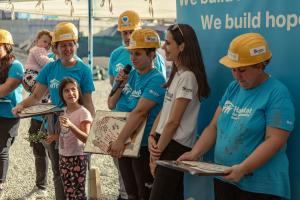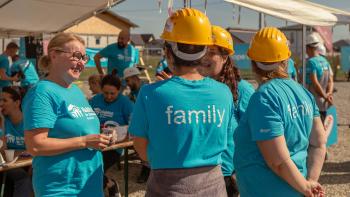Habitat announces new project for displaced families in Ukraine, with the support of Saint-Gobain Foundation
Habitat for Humanity International and Swiss Capacity Building Facility launch partnership to expand climate-resilient housing finance and insurance in Kenya
Ukraine adopts new housing law to replace Soviet-era system and make housing affordable
Tanzania Mortgage Refinance Company Limited and Habitat for Humanity launch landmark housing microfinance solution in Tanzania
New housing research. Repurposing Empty Spaces to Address the Housing Crisis in Great Britain
New housing research. Turning Vacant Spaces into Social Housing in Poland
From Nairobi to Belém: Putting housing at the heart of climate migration and community resilience
Across Africa and the Global South, climate change is transforming the way communities move, settle, and survive. Droughts, floods, and environmental degradation are pushing families from rural areas into cities at unprecedented rates — and urban informal settlements are absorbing the shock.
In November, Habitat for Humanity contributed to critical conversations shaping the future of climate migration, urban resilience, and community-driven adaptation.
Across Africa and the Global South, climate change is transforming the way communities move, settle, and survive. Droughts, floods, and environmental degradation are pushing families from rural areas into cities at unprecedented rates — and urban informal settlements are absorbing the shock.
In November, Habitat for Humanity contributed to critical conversations shaping the future of climate migration, urban resilience, and community-driven adaptation. The two strategic platforms approached this challenge from complementary angles:
- The MAPS Summer School on Migration and Displacement in Nairobi, organized by AMREF, European Union, University of Sapienza, and partners.
- A COP30 side event in Belém, Brazil, on decentralizing Sanitation for Decent Livelihoods in Rural and Peri-Urban Areas in the Global South, organized by Kenya Water Institute (KEWI), SATO/LIXIL, Global South Climate Initiatives (GSCI), and partners.
Understanding climate migration through the lens of housing and urban informality
At the MAPS Summer School, we joined researchers, policymakers, and practitioners explored migration and displacement dynamics across Sub-Saharan Africa. Discussions focused on refugees, migrants, and internally displaced persons (IDPs), examining how climate, conflict, and economic shocks are driving new patterns of mobility.
One of the findings was that climate migration is increasingly urban, with informal settlements absorbing the people least equipped to cope with environmental and economic pressures. Yet most cities lack adequate affordable housing, inclusive planning frameworks, and policies that integrate climate and migration realities.
Participants noted that informal settlements are experiencing intensified pressures like higher population density, stretched basic services, and increased vulnerability to climate hazards like floods and disease outbreaks. These dynamics are rarely acknowledged in national climate strategies or mitigation plans.
This “policy blindness” leaves millions at risk.
Drawing from our research Slum Blind – Overlooked Links Between Climate Migration and Informal Settlements, we highlighted how climate-driven displacement is accelerating urban migration into already overstretched informal settlements, reinforcing the urgency for integrated housing, climate, and migration policies. We highlighted the need for stronger community-led approaches and improved data to guide more effective and inclusive responses.
Discussions emphasized the need for stronger collaboration across academia, civil society, and development actors — a gap Habitat for Humanity continues to help bridge through research partnerships and advocacy.
Climate-resilient WASH as a driver of adaptation and livelihoods
At the high-level COP30 side event framed around decentralizing sanitation for decent livelihoods in rural and peri-urban areas in the Global South, we highlighted lessons from our experience in community-led WASH systems in Africa — demonstrating that sanitation technologies and housing interventions succeed only when communities co-design and drive them. WASH was seen as an urgent and often overlooked connection within climate adaptation.
Key takeaways that connect back to the housing agenda included:
- Sanitation is climate adaptation: resilient systems reduce contamination and disease outbreaks during floods, conserve waters during droughts, especially in informal settlements, which are also where climate migrants often live.
- Community-led and behavior-driven design is vital for sustainability and long-term ownership. This aligns with insights from MAPS showing that displaced populations are powerful agents of their own resilience when meaningfully included in planning, governance, and local decision-making.
- Decentralized sanitation can unlock livelihoods, especially for youth and women, through service provision and climate-smart sanitation enterprises.
The invitation to the KEWI–AfDB foundational partnership team to advance decentralized sanitation models across Kenya, Africa, and the broader Global South signals growing recognition of our role in people-centered basic services and climate resilience programming.
The discussions also opened pathways linked to NDCs (Nationally Determined Contributions), GCF (Green Climate Fund) mechanisms, AfDB (African Development Bank) financing, and other climate finance streams — positioning Habitat to expand its leadership in climate-resilient WASH.
Conclusion: housing must be recognized as climate infrastructure
Taken together, the Nairobi and Belém engagements highlight a crucial truth:
We cannot advance climate adaptation, manage migration pressures, or build resilient cities without placing housing and basic services at the center.
As displacement increases and urban populations grow, the need for integrated, community-led, and evidence-based solutions becomes even more urgent.
Habitat for Humanity will continue advocating for housing to be recognized as essential climate infrastructure — and ensuring the voices of vulnerable communities shape the policies and systems that affect their lives.
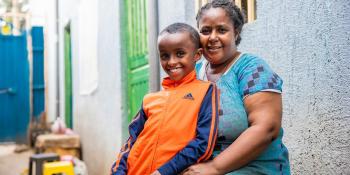
From Nairobi to Belém: Putting housing at the heart of climate migration and community resilience
Everything you need to know about volunteering with Habitat for Humanity
At Habitat for Humanity, volunteering takes on many shapes. Not every volunteer may swing a hammer, but every volunteer helps move us closer to a world where everyone has a decent place to live.
In just the first half of 2025, more than 3,300 people volunteered with Habitat for Humanity across Europe and the Middle East. Some helped build homes in Romania, Kenya, and Malawi. Others organized charity dinners in Poland, sorted donated goods in Irish ReStores, ran upcycling workshops in Great Britain, or supported communications and events in Jordan and Egypt. No two roles are alike. There is something for everyone who is willing to help.
At Habitat for Humanity, volunteering takes on many shapes. Not every volunteer may swing a hammer, but every volunteer helps move us closer to a world where everyone has a decent place to live.
In just the first half of 2025, more than 3,300 people volunteered with Habitat for Humanity across Europe and the Middle East. Some helped build homes in Romania, Kenya, and Malawi. Others organized charity dinners in Poland, sorted donated goods in Irish ReStores, ran upcycling workshops in Great Britain, or supported communications and events in Jordan and Egypt. No two roles are alike. There is something for everyone who is willing to help.
Meet Veronika
“Each of our programs is unique and provides unique volunteering experiences,” says Veronika Cruz Bodova, Senior Volunteer Engagement Specialist, who has worked in the field since 2014. “The goal is to connect a wide range of people to the communities we serve through meaningful work that has a lasting impact.”
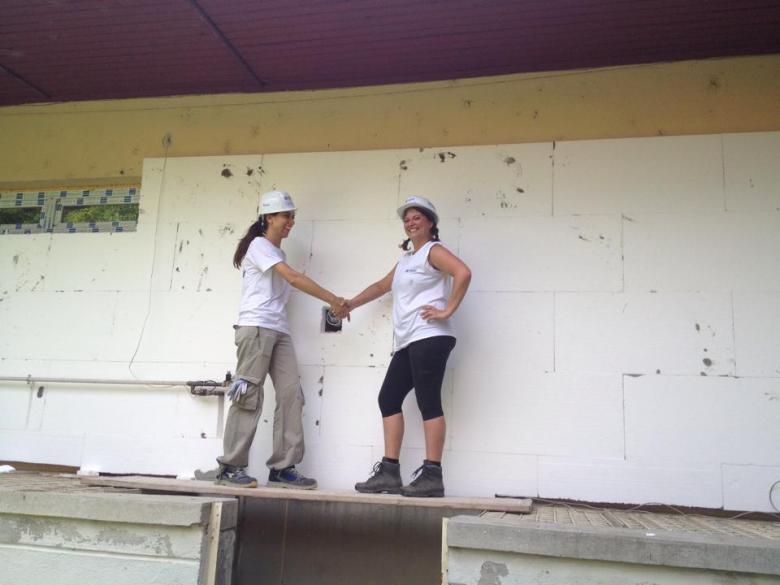
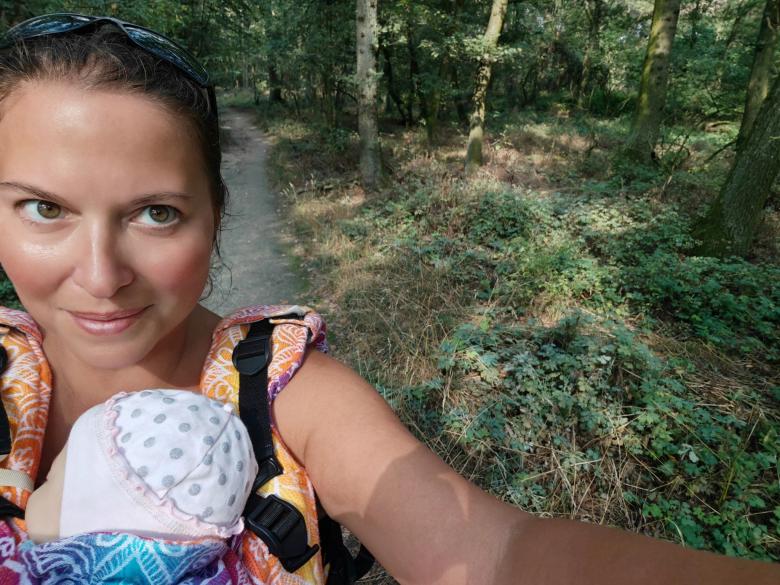
For years, Veronika has seen the power of Habitat’s approach firsthand, but her experience with volunteering started before joining Habitat.
“I started volunteering when I was 14, as an assistant in a school for visually impaired and blind children in Bratislava, Slovakia. Later, I volunteered with youth with disabilities in Prague, Spain, and Turkey. It taught me how much you can learn by stepping out of your comfort zone. It’s how I met people from different cultures and backgrounds—many of whom I’m still friends with today.”
Global Village
Habitat for Humanity’s best-known program is Global Village. This volunteer opportunity allows individuals and groups to travel to a new country and work side by side with local communities on construction and renovation projects.
Working alongside the people you’re helping creates mutual respect and deepens understanding. For those who do want to go abroad, Global Village offers a unique way to support communities around the world, without slipping into the trap of voluntourism, which often refers to short-term volunteer experiences that prioritize the traveler’s experience over meaningful, lasting impact.
“It is important to bear in mind that voluntourism is not what we do, and it’s not what we should ever do,” Veronika says. “Our volunteers do real work. If you’ve ever done a week-long build, you know: the fatigue and pain usually arrive by day three.”
“If you’re looking to wash an elephant or squeeze in a visit to an orphanage between tourist activities, Habitat probably isn’t the right fit,” Veronika says. But if you’re ready to serve, to learn, and to contribute meaningfully? There’s a place for you here.
Habitat’s Global Village is an immersive experience rooted in genuine partnership, but there are dozens of other ways to get involved without ever getting on a plane.
Retail, events, and more
Habitat for Humanity ReStores in Ireland and the UK are second-hand thrift stores that sell donated furniture, household goods, and building materials at affordable prices. All proceeds go directly to further Habitat work.
At the stores, volunteers sort through donations, assist customers, and organize displays. This is a great option for people who enjoy retail, sustainability, and customer service. The stores are places that become little community hubs with people coming in and out to shop and donate. Volunteers invest their time while building real relationships because they are in direct contact with the people who are benefiting from the donations.
Something for everyone
Volunteers help with construction, yes, but also with event planning, marketing, and fundraising. Some support office operations or IT. Others contribute to photography, design, and storytelling. Some volunteers give a few days of their time. Some give years.
And some contribute through advocacy, using their voice to raise awareness, push for better housing policies, or influence decision-makers. Whether writing letters, organizing campaigns, or joining local housing coalitions, advocacy volunteers help create long-term, systemic change.
“Not everyone is on a build site. But every one of them is vital to our mission, to make sure everyone has a decent place to live,” says Veronika.
Partnerships with schools
For Veronika, as Habitat’s program specialist, one of the most exciting developments in recent years has been the way Habitat for Humanity partners with schools and universities!
“I love that we get to work with educational institutions that actually implement volunteering into their semester or curriculum. It becomes part of a social learning experience, not just an activity,” says Veronika, who herself started out volunteering in schools many years ago.
Habitat for Humanity engages youth in ways that are meaningful and age-appropriate. Students not only learn practical skills but also reflect on global housing challenges and how they can address them.
University partnerships have even expanded to include research, architecture collaborations, and long-term internships. These opportunities let students contribute through what they’re studying, whether it’s engineering, communications, or social work.
Corporate volunteering
More and more companies are choosing to volunteer with Habitat for Humanity as a way to give back while strengthening their teams.
Corporate volunteering is an opportunity for employees to step away from the office and engage in volunteer work, whether that’s building homes, helping in ReStores, or contributing professional skills like finance, marketing, or HR support.
These partnerships help Habitat fund its projects and allow businesses to live out their corporate social responsibility in tangible ways. At the same time, employees gain valuable team-building experiences and often return to work energized and more connected to their communities and teams.
“We are proud to support Habitat for Humanity through this long-term partnership, which is grounded in shared values and a common belief that everyone deserves a healthy, safe and decent place to live. It is inspiring to see colleagues from across the VKR Group coming together in a Donate Your Steps walking challenge for a cause that brings new life to old buildings - and new hope to families,” says Robert Purol, Board Member, Employee Foundation of the VKR Goup & General Manager, NB Polska Sp. z o.o.
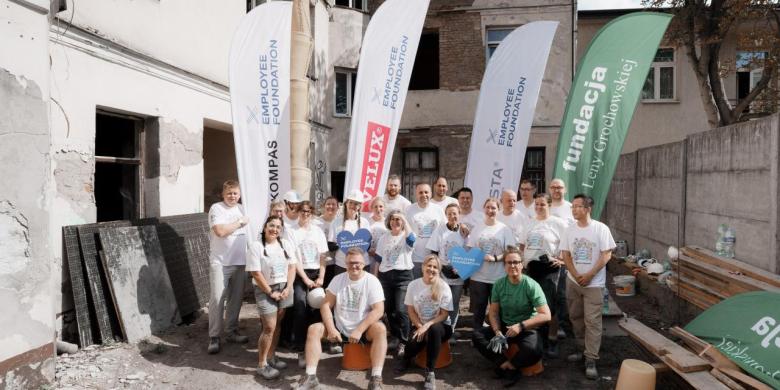
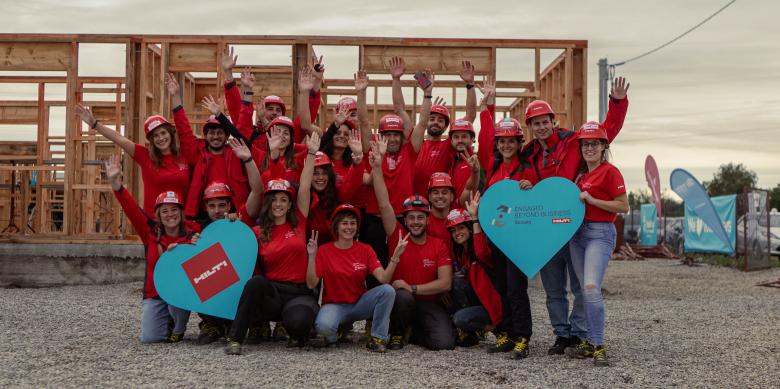
Volunteering the right way
Veronika has seen firsthand what happens when expectations go wrong: “That so-called ‘savior complex’, especially when volunteers from the Global North work in Global South communities, can do more harm than good. It can lead to burnout, disappointment, and even damaged relationships. Our communities are not projects. They are partners.”
It’s important to remember that when we volunteer, we go to help, not to save. “A meaningful volunteer experience can open doors, personally, professionally, and emotionally. It can help you discover new skills, new friendships, and even a new sense of purpose. You grow. And you have fun while doing it.”
“Volunteering builds more than houses,” Veronika says. “It builds understanding. It builds community. And it gives all of us a chance to be part of something that lasts.”
“The most important thing for me is that our volunteers do impactful work, on and off the build site. What they do matters. And what they learn often stays with them for life. I would recommend volunteering to anyone who’s willing to broaden their horizons and experience something new. You have to come in with the right mindset. You’re not a hero or a savior, you’re a partner, working alongside others to improve housing conditions.”
Whether you’re a student, retired, or someone just looking to get involved, Habitat for Humanity offers volunteer opportunities that match your time, talents, and interests.
You don’t have to be a construction expert or commit full-time. All you need is a willingness to show up, learn, and contribute.
Ready to build something that lasts?
Discover volunteer opportunities near you or abroad at: www.habitat.org/volunteer.
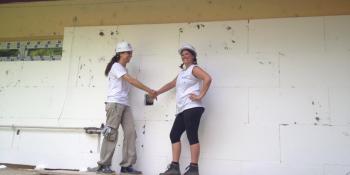
Everything you need to know about volunteering with Habitat for Humanity
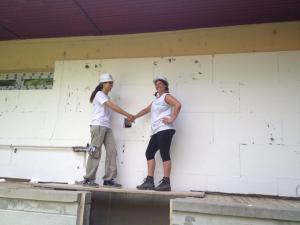
Hands, hearts, and voices in Romania
Volunteering has a unique power to build team spirit, create shared memories, and fill people with a real sense of accomplishment. It pulls us away from screens and routines and places us into something deeply human, working side by side, learning from one another, and becoming a community.
This same power has been visible across Romania over the past three years. From 2023 to 2025, Habitat for Humanity Romania organized six Hope Builds, bringing people together from Romania and beyond. These volunteer construction events unite teams, strangers, colleagues, and friends to build homes for families facing difficult socioeconomic and family situations.
Volunteering has a unique power to build team spirit, create shared memories, and fill people with a real sense of accomplishment. It pulls us away from screens and routines and places us into something deeply human, working side by side, learning from one another, and becoming a community.
This same power has been visible across Romania over the past three years. From 2023 to 2025, Habitat for Humanity Romania organized six Hope Builds, bringing people together from Romania and beyond. These volunteer construction events unite teams, strangers, colleagues, and friends to build homes for families facing difficult socioeconomic and family situations.
Across these builds, the scale of what the volunteers and families achieved together is remarkable. In 30 days of steady construction, we saw hundreds of hours of teamwork, many meals shared, and new homes built from the ground up.
What happens in these moments of shared effort goes far beyond construction. Volunteers discover strength they didn’t know they had, families feel seen and supported, and communities form in ways that are rare in our fast-paced world. It is in this spirit of unity and purpose that the words of Habitat for Humanity Romania’s CEO, Roberto Patrascoiu, ring especially true:
“At Habitat, we say our volunteers are our hands, hearts, and voices.”
Hope Builds prove this every year. Volunteers use their hands to lift boards and lay foundations. They bring their hearts to every moment of encouragement and kindness. And they become voices, sharing stories
What Hope Build gives to the volunteers
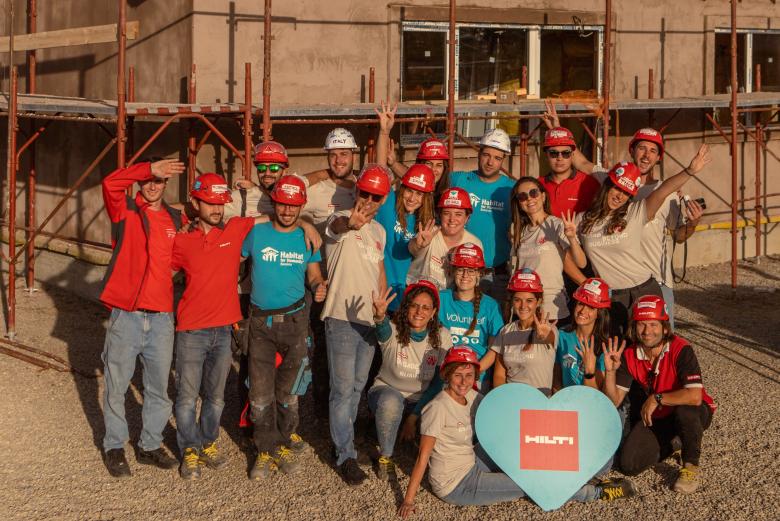
Listen to the sound of 100 hammers hitting nails all at the same time. See the misty eyes of the families as they take in the scene of their new home being built and of all the people who came to work alongside them. Smell the dust in the air, and the smell of hard work as a better future takes shape.
The atmosphere of a Hope Build is like no other. Each volunteer came with their own reason for participating, but as the hours went on and they started to learn each other’s names and learned about the families they were working alongside, all their reasons blended into a shared purpose to help families build a better future.
Many volunteers have come back year after year, just like Constantina, “The first time I joined Habitat was in 2017, to build 36 houses!” The pull for real-life experience with hard labor and a purposeful challenge is what brings many to the construction site. The time offline can be therapeutic, as it was for Larissa. Hope Builds is an amazing opportunity to break out of the online work, pick up materials, and feel the effects of hard work. A volunteer described his time on the site, saying, “Doing good makes you feel good inside.”
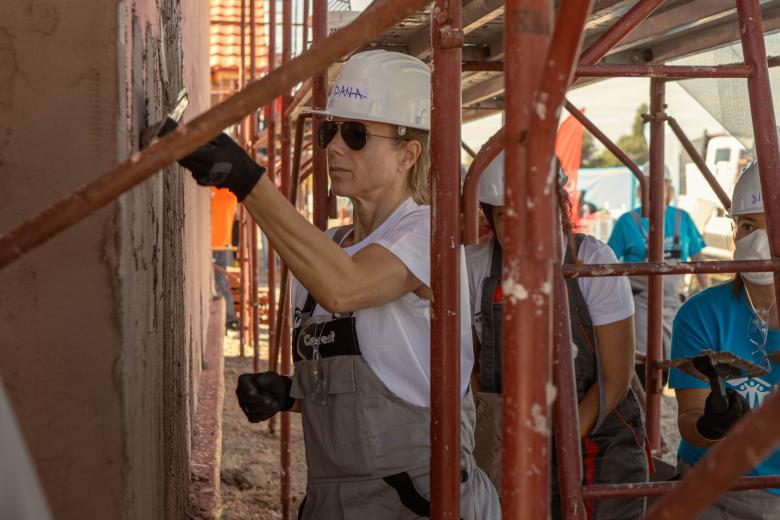
A family’s gratitude
For the families working alongside the volunteers, the experience is transformative. From the words of a mother who worked with our amazing volunteers to quite literally rebuild her life: “It’s a blessing beyond words. Thank you, Habitat for Humanity, from the bottom of my heart!”
When generosity meets action
Hope Builds do not happen alone. Behind every raised wall stood donors whose generosity made the projects possible. Many volunteers spoke about this partnership and how inspiring it was to see resources given by donors and partners turn into something tangible through the work of their own hands.
“With a small gesture, like this one,” says Ana, a volunteer, as she brushes her paint roller across the siding of the house, “you can really change someone’s life!”
None of this would be possible without their support. Their commitment fuels us. Thank you for your continued support of our Habitat for Humanity Europe and the Middle East Area Office.
Doka, Hilti Foundation, Hilti Group, Villum Fonden, Employee Foundation of the VKR Group, Umdasch Group AG, ArcelorMittal Building Solutions, Etex Gimmersta Wallpaper, GRAITEC GROUP, GRUNDFOS, Holcim, Laudes Foundation, VK architects+engineers, part of Sweco, Proman, Saint-Gobain Foundation, SCBF, SOMFY FOUNDATION, Summit International Flooring, SWISS KRONO Group, wienerberger, Xella Group.
Are you ready to build something that lasts?
Discover volunteer opportunities near you or abroad at: www.habitat.org/volunteer.
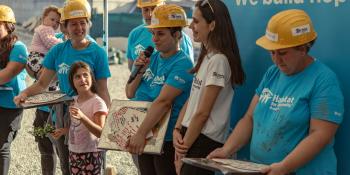
Hands, hearts, and voices in Romania
